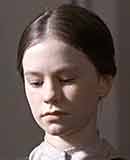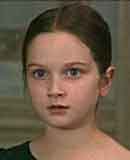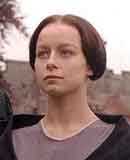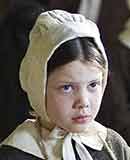Jane Eyre
The central character and heroine of the story. Bearing many similarities to Charlotte Brontë herself, the book follows her story from an unloved orphan at Gateshead through romance and disappointment to a happy conclusion.
Portrayals


















Quotes about Jane
Chapter 2. I know that had I been a sanguine, brilliant, careless, exacting, handsome, romping child – though equally dependent and friendless – Mrs Reed would have endured my presence more complacently…
Chapter 4. "You are a strange child, Miss Jane," she said, as she looked down at me; "a little roving, solitary thing: and you are going to school, I suppose?"
Chapter 4. "Because you're such a queer, frightened, shy little thing. You should be bolder."
Chapter 5. I hardly know where I found the hardihood thus to open a conversation with a stranger; the step was contrary to my nature and habits: but I think her occupation touched a chord of sympathy somewhere; for I too liked reading, though of a frivolous and childish kind; I could not digest or comprehend the serious or substantial.
Chapter 10. "You're not grown so very tall, Miss Jane, nor so very stout," continued Mrs Leaven.
Chapter 10. "No, Miss Jane, not exactly: you are genteel enough; you look like a lady, and it is as much as ever I expected of you: you were no beauty as a child."
I smiled at Bessie's frank answer: I felt that it was correct, but I confess I was not quite indifferent to its import: at eighteen most people wish to please, and the conviction that they have not an exterior likely to second that desire brings anything but gratification.
Chapter 11. I sometimes regretted that I was not handsomer; I sometimes wished to have rosy cheeks, a straight nose, and small cherry mouth; I desired to be tall, stately, and finely developed in figure; I felt it a misfortune that I was so little, so pale, and had features so irregular and so marked.
Chapter 14. …that I was myself in my usual Quaker trim, where there was nothing to retouch – all being too close and plain, braided locks included, to admit of disarrangement…
Chapter 23. It is one of my faults, that though my tongue is sometimes prompt enough at an answer, there are times when it sadly fails me in framing an excuse; and always the lapse occurs at some crisis, when a facile word or plausible pretext is specially wanted to get me out of painful embarrassment.
Chapter 24. (I had green eyes, reader; but you must excuse the mistake: for him they were new-dyed, I suppose.)
Chapter 27. You entered the room with a look and air at once shy and independent: you were quaintly dressed – much as you are now. I made you talk: ere long I found you full of strange contrasts. Your garb and manner were restricted by rule; your air was often diffident, and altogether that of one refined by nature, but absolutely unused to society, and a good deal afraid of making herself disadvantageously conspicuous by some solecism or blunder; yet when addressed, you lifted a keen, a daring, and a glowing eye to your interlocutor's face: there was penetration and power in each glance you gave; when plied by close questions, you found ready and round answers.
Chapter 29. "Ill or well, she would always be plain. The grace and harmony of beauty are quite wanting in those features."
Chapter 29. "I am, sir." It is my way – it always was my way, by instinct – ever to meet the brief with brevity, the direct with plainness.
Chapter 36. "She was a little small thing, they say, almost like a child."
